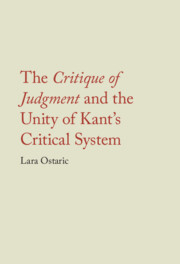Book contents
- The Critique of Judgment and the Unity of Kant’s Critical System
- The Critique of Judgment and the Unity of Kant’s Critical System
- Copyright page
- Contents
- Acknowledgments
- Note on Sources
- Kant’s Writings by Abbreviations Used for German Titles with Corresponding Translations
- Introduction
- Part I The Highest Good and the Postulates
- Part II Aesthetic Judgment and the “Moral Image”
- Part III Teleological Judgment and the “Moral Image”
- Chapter 7 Kant’s Account of Nature’s Systematicity and the Unity of Theoretical and Practical Reason
- Chapter 8 Organisms as “Natural Ends” and Reflective Judgment’s “Image” of Externalized Freedom
- Chapter 9 Kant’s Teleological Philosophy of History
- Concluding Remarks
- Bibliography
- Index
Chapter 9 - Kant’s Teleological Philosophy of History
from Part III - Teleological Judgment and the “Moral Image”
Published online by Cambridge University Press: 15 August 2023
- The Critique of Judgment and the Unity of Kant’s Critical System
- The Critique of Judgment and the Unity of Kant’s Critical System
- Copyright page
- Contents
- Acknowledgments
- Note on Sources
- Kant’s Writings by Abbreviations Used for German Titles with Corresponding Translations
- Introduction
- Part I The Highest Good and the Postulates
- Part II Aesthetic Judgment and the “Moral Image”
- Part III Teleological Judgment and the “Moral Image”
- Chapter 7 Kant’s Account of Nature’s Systematicity and the Unity of Theoretical and Practical Reason
- Chapter 8 Organisms as “Natural Ends” and Reflective Judgment’s “Image” of Externalized Freedom
- Chapter 9 Kant’s Teleological Philosophy of History
- Concluding Remarks
- Bibliography
- Index
Summary
In his writings on our philosophical representations of human history Kant offers both epistemic and moral justification for the use of teleological principles. Following his epistemic justification, in order to make human history intelligible to ourselves we must represent the individual events in human history under the Idea of “nature’s aim.” By the latter Kant understands the formation of civil society to be based on the principle of right within which the “ultimate end of nature,” the formation of culture and the cultivation of human sensibility that is amenable to the demands of morality, would be possible. Kant’s moral justification is comprised of two parts: a moral-psychological argument for strengthening moral Glaube and the argument that emphasizes the objective reality (albeit from a “practical point of view”) of our representation of human history as progressing. While the former argument reinforces our existing moral disposition, the latter reinforces reason’s unity.
Keywords
- Type
- Chapter
- Information
- The Critique of Judgment and the Unity of Kant's Critical System , pp. 235 - 262Publisher: Cambridge University PressPrint publication year: 2023

